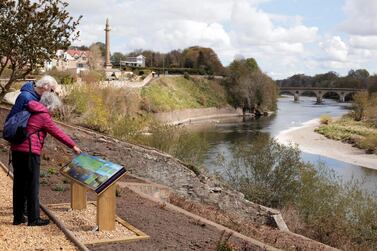Iran is attempting to influence Scotland to split from the UK by using fake social media accounts to “promote disunity and division”, a think tank said.
Tehran is putting “considerable effort” into developing a strong political relationship with Scottish nationalists who want independence, a report by the Henry Jackson Society in London said.
It is understood that Iran, which has a long history of hostility towards Britain, would like to see Scotland break away as a means of undermining UK power.
With key elections to the Scottish Parliament on Thursday, the London think tank claimed cyber specialists working for Iran were using false Twitter and Facebook accounts to influence voters.
If the ruling Scottish Nationalist Party (SNP) wins a strong majority in Edinburgh, it is highly likely to begin the process of seeking another independence referendum, the first since 2014.
“Iran is almost certainly looking to disrupt our current elections, most likely those under way for the Scottish Assembly,” the report said.
“Iran’s activities in cyberspace are designed to attack the constitutional integrity of the UK. There appear to be elements within Iran who are willing to interfere in the UK’s domestic politics to encourage Scottish separatism.”
Facebook has closed 446 fake Iranian accounts for breaching its policies against foreign interference. In February, the social media outlet published an image of a post from a fake Iranian online persona mocking the Scottish Conservatives.
Additionally, more than 100 domain names being used in influence campaigns by Iran’s Islamic Revolutionary Guard Corps were seized by the US last year. These included sites such as syria-victory.com and yemenpress.org, related to regional Iranian foreign policy objectives. But there were also domains such as criticalstudies.org “which few would immediately associate” with the Iranian military.
The report highlighted a history of strong links between Iran and the SNP that included meetings between prominent members of the pro-independence party and Tehran regime figures.
“Several Scottish nationalists have embraced this approach, even visiting the country in search of a future working relationship and developing ties with representatives of the Iranian state at home,” it said. In 2015, officials from Scottish Development International visited Iran to discuss opportunities in the oil and gas sector.
Iranian activity has been increasingly detected in Scotland in the past year and the regime "put considerable effort into developing its political relationships with Scottish political elites who advocate independence", the report said.
It found Iran has established “Russian-style disinformation campaigns” of fake websites and internet accounts to disrupt democratic political systems.
But increased focus on the Iran-SNP relationship “disrupted engagement” between Dr Mohammad Shomali, former representative in the UK for Iran's supreme leader, Ayatollah Ali Khamenei, and Scottish First Minister Nicola Sturgeon.
“Whilst there is no suggestion that Scottish nationalist politicians have encouraged or endorsed Iran’s interference, it sets a troubling precedent, with the issue of a potential second referendum on Scottish independence a deeply contentious one,” the report said.
The report’s findings were part of a broader investigation into Iran’s destabilising activities in the UK that will be published later this week.








